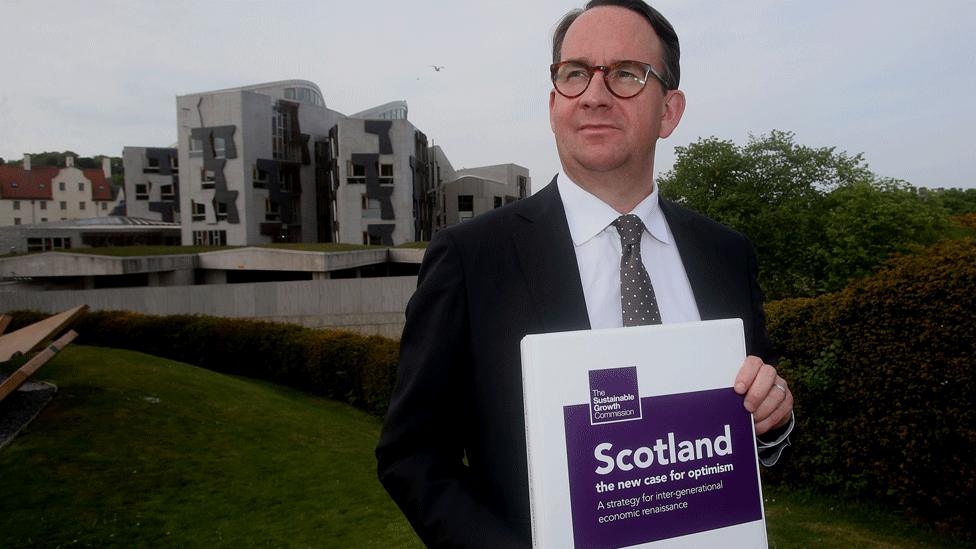IFS says SNP's growth plan could see spending squeeze post-independence
- Published

Andrew Wilson was chairman of the Sustainable Growth Commission set up by the SNP
Economic research unit the Institute for Fiscal Studies said an independent Scotland could face a tighter squeeze on spending than the rest of the UK.
It made the claim after analysing the SNP's .
However, the IFS did welcome the paper's new approach to tackling Scotland's national deficit.
A spokesman for the SNP said the commission was "absolutely explicit in its rejection of austerity" instead proposing "real terms spending growth".
The fresh drive to look at Scottish independence was requested by party leader Nicola Sturgeon and chaired by economist and former SNP MSP Andrew Wilson.
The paper, published at the end of last month, has received come criticism from within the independence movement for setting out a deficit reduction plan that would put a newly-independent Scottish government under tough spending pressures in its early years.
The Growth Commission also backed the continued use of sterling as the currency in an independent Scotland.
This would be without needing to have agreement from Westminster, but on the basis that Holyrood would have no influence on monetary policy, or the protection of the Bank of England in a financial crisis.
The commission's findings will be debated by SNP members over the coming months.
'It should be commended'
In his analysis of the paper, the : "The commission claims their proposals do not amount to austerity as public spending would be increasing in real terms.
"But their plans would mean spending on public services and benefits falling by 4% of GDP over the course of a decade.
"That's on top of the reductions delivered and planned by the UK government for the decade from 2010 to 2020, and the commission's proposals for immediate cuts to defence and other spending currently undertaken by the UK government.
"The ageing of the population - which adds to pressures on the health, social care and state pension budgets - means that keeping to an overall spending increase of just 0.5% a year would likely require cuts to many other public services. Unsurprisingly, the commission does not say where the axe would fall."
David Phillips said keeping to an overall spending increase of just 0.5% a year would likely require cuts to many other public services
He added: "It's difficult to see how a newly-independent Scotland could avoid the sort of deficit reduction programme set out by the Sustainable Growth Commission.
"It should be commended for setting out how they would approach this issue head-on, rather than ignoring it, or resorting to over-optimistic forecasts on revenues from the North Sea, for instance, to massage down the scale of the problem."
However, under attack from Labour for what Scottish leader Richard Leonard has called a "cuts commission", Ms Sturgeon insisted the squeeze on spending - increasing it only slightly, and at a slower pace than economic growth - was not "austerity".
An SNP spokesman insisted that if the Growth Commission's approach had been followed, the ÂĢ2.6bn of cuts to the Scottish government's budget by Westminster "would have been completely reversed, with the prospect of additional public spending beyond that".
He added: "The report has kick-started a serious and welcome debate over Scotland's future, and Westminster parties are clearly rattled by the boost it has given to the independence case.
"The Growth Commission contrasts the clear opportunities of independence with the despair and economic damage of Brexit - and replaces fear with optimism and hope about Scotland's future."